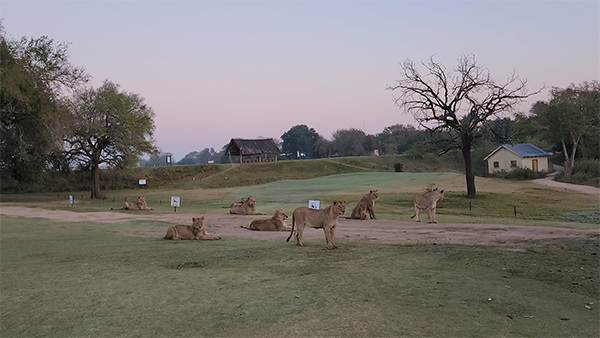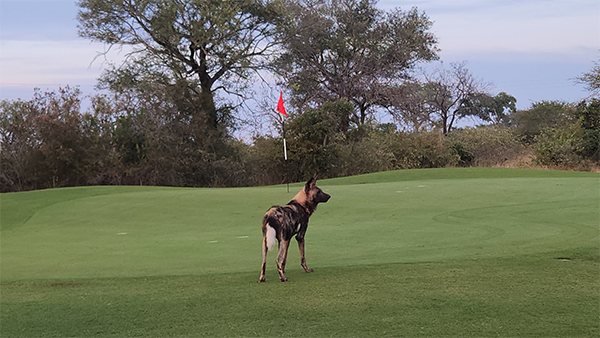
Nestled within the vast expanse of Kruger National Park in South Africa, Skukuza Golf Club stands as a unique testament to the harmonious coexistence of human recreation and untamed wildlife. The tagline “the wildest course in the world” captures the essence of this golfing haven, where players navigate fairways teeming with lions, leopards, and other wild creatures. In this immersive exploration, we delve into the history, challenges, safety protocols, and the enchanting allure that makes Skukuza Golf Club a one-of-a-kind destination, transcending the boundaries of conventional golfing experiences.
Established in 1972, Skukuza Golf Club began as a modest endeavor on a disused landing strip within Kruger National Park. Back then, “greens” were more accurately described as “browns,” and the clubhouse consisted of a few drinks stashed in a car boot. The club’s transformation into a global golfing destination began in 1999 when it opened its doors to the public, inviting players to experience golf amidst the untamed beauty of Africa.
Over the years, practical upgrades and expansions have accompanied Skukuza’s rise to prominence. From a few holes on a disused landing strip, the club has grown into a nine-hole course with a clubhouse, attracting golfers from around the world. The absence of traditional bunkers, a conscious choice to accommodate potential hippo and crocodile nests, adds a unique flavor to the course. Instead, the landscape is dotted with “aerial bunkers”—trees that contribute to the course’s challenges and keep the greenkeeping team on their toes.
Imagine teeing off with the sunrise as a pride of lions lazily occupies a nearby tee box. Lions, leopards, hyenas, elephants, and a myriad of other species freely roam the course, creating a surreal backdrop for golfers. Head greenskeeper Jean Rossouw, with his roots in the national park, leads the efforts to ensure a delicate balance between human recreation and wildlife conservation.
Safety is paramount at Skukuza Golf Club, where animals hold the title of spectators. Rossouw and his team conduct daily early morning patrols to flag any animal presence and assess overnight damages. In the event of potential danger, certain holes or the entire course may be closed. A testament to these safety protocols occurred in August 2022 when a giraffe became the focus of a feeding frenzy, prompting a temporary course closure until the situation was deemed safe.
Contrary to popular misconceptions, the animals at Skukuza Golf Club are not a threat to golfers. Rossouw emphasizes the mutual respect that exists between players and wildlife. Golfers sign activity indemnity forms, acknowledging the unique environment they are stepping into, fostering an understanding that allows both humans and animals to coexist peacefully.

Prowling Predators: Lions, Leopards, and Hyenas
Skukuza’s fairways host a captivating array of predators, from the majestic lions basking in the afternoon sun to the perfectly camouflaged leopards prowling in the thick bush. Hyenas wait in the wings, ready to scavenge from a lion pride’s kill. Rossouw and his team play a crucial role in ensuring these predators peacefully share the golfing space with humans.
The par-three ninth hole at Skukuza Golf Club stands out not only for its golfing challenges but also for its unique surroundings. Golfers take shots over Lake Panic, a favored hunting spot for resident Nile crocodiles. The lake, shared with a thriving hippo population, adds an extra layer of excitement and intrigue to the golfing experience. While the large predators capture attention, it’s the seemingly less imposing species that cause the most disruption for Rossouw and his team. Nyala, an antelope native to the area and other hooved animals, particularly African buffaloes, pose unique challenges. The unpredictable nature of buffaloes, capable of charging golf carts, keeps the greenkeeping team on high alert.
Skukuza Golf Club’s commitment to wildlife conservation is evident in its efforts to maintain the course’s natural state. Rossouw’s vision aligns with the ethos of allowing animals to roam freely in their environment. The club’s success in achieving this delicate balance has turned it into a global destination for golf enthusiasts seeking an authentic connection with nature.
Skukuza’s rise to fame is not only attributed to its golfing challenges but also to its effective use of social media. With a dedicated “spectators” tab on the club’s Instagram, the diverse wildlife becomes a marketing tool, attracting visitors from across the globe. The viral appeal of golfers sharing fairways with lions and other animals has contributed to over 1,000 rounds played at the club in September alone.
Skukuza Golf Club has evolved from a local golfing spot to a global destination, welcoming members from around the world. The club’s increasing popularity is evident in rising membership numbers and a front-foot social media strategy that capitalizes on the unique wildlife experiences. The allure of playing golf in close proximity to Africa’s iconic species has become a draw for both avid golfers and nature enthusiasts.
As the head greenskeeper, Jean Rossouw is not just a caretaker of the course but a steward of the wilderness. His deep connection to Kruger National Park, having grown up within its boundaries, makes him uniquely suited to navigate the challenges posed by both the golfing community and the wild inhabitants. Rossouw’s dedication to maintaining the delicate balance reflects in the success of Skukuza Golf Club as a harmonious haven for humans and wildlife.
While golfers revel in the thrill of playing in such a unique environment, Rossouw’s most cherished moments occur when the fairways are devoid of golfers. On quiet mornings, he takes leisurely drives around the course, finding solace in observing African wild dogs—the skittish and endangered species that epitomize the untamed beauty of Kruger National Park.
Skukuza Golf Club, with its captivating blend of golfing challenges and untamed wildlife encounters, stands as a beacon of harmony between human recreation and conservation. From its humble beginnings to a global golfing destination, the club has embraced its unique

